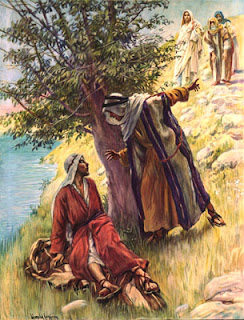Readings: Acts 18:23-28; Ps 47; John 16:23b-28
___________________________
Back in my other life, in my consulting days, I was often asked to talk to industrial salespeople and sales managers. One thing I tried to instill in them was the need to focus on both the roadwork and the homework. On homework, I meant becoming true experts on their products and services, and equally important, learning everything they can about their customers. Only then will their roadwork bring dividends.
We see a little of that in our reading from Acts. Apollos, an evangelist from Alexandria, was an eloquent preacher but he was lacking in knowledge of the Christian faith. So, the married team of Priscilla and Aquila took him aside and spent some time teaching Him so he could proclaim the truth of the Gospel confidently. It’s a beautiful example of believers helping, supporting, and encouraging each other in the faith, helping one another to grow in the Lord.
As I thought about today's readings, I recalled a few of my own experiences teaching others, both successful and not so successful.
About 20 years ago, shortly before we moved to Florida, I was asked to give a brief reflection to an ecumenical group in our Cape Cod town. It was during the Lenten season and the pastors of all the Christian churches thought it would be good to have a series of prayer meetings, open to anyone who cared to attend.
Anyway, my pastor volunteered me to represent our parish, and the Congregational minister who had organized everything, asked me to preach at the first of these weekly meetings. The topic he gave me was prayer...so, there I was preaching to a couple of hundred folks, mostly Protestants, from a half-dozen denominations.
At one point early in my talk, I asked the participants, “To whom do you pray?” Almost unanimously, they answered, “Jesus!” I had expected this, and I told them that praying to Our Lord Jesus Christ was certainly a good thing.
But then I went to the Gospel, and read a number of different passages where Jesus instructs His disciples on prayer. Of course, the most famous is the Lords’ Prayer, or as we Catholics often call it, The Our Father, echoing its first words:
“Our Father, who art in heaven, hallowed be Thy name…” [Mt 6:9]
I then turned to John’s Gospel and read the Word from today’s
passage:
“Amen, amen, I say to you, whatever you ask the Father in my name he will give you” [Jn 16:23].
I followed this with another half-dozen passages from the Gospels and St. Paul’s letters, teaching us to pray to the Father, always in Jesus’ Name, and guided by the Holy Spirit.“…the Spirit helps us in our weakness. For we do not know how to pray as we ought, but the Spirit Himself intercedes for us with groanings too deep for words.” [Rom 8:26].
So, what does today’s Gospel passage, and the New Testament in general, teach us about prayer? Well, among other things, we learn that prayer should be Trinitarian: to the Father, in the Son’s Name, and through the workings of the Holy Spirit. We need only listen to the Eucharistic prayer at every Mass, a prayer addressed to the Father, through the Son – yes, “through Him, with Him, and in Him – and in the unity of the Holy Spirit.” Our prayer, then, has the pattern of the Trinity stamped on it.
As I said to that mixed congregation on Cape Cod, “Pray to Jesus if you like, but remember that any prayer to Jesus will always unite us with the Father through the love and power of the Holy Spirit.” Paul, once again, put it so much better:
“…you received a spirit of adoption, through which we cry, “Abba, Father!” The Spirit itself bears witness with our spirit that we are children of God…” [Rom 8:15-16]











